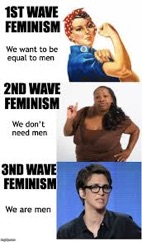Women have never been so able as they are today; so why are we still so angry?
The number of female heads of state is at an all-time high, girls are outperforming boys at school, there are a higher number of females attending university and millennial women are out-earning their male peers. In topical news, the female sporting trio Simone Biles, Brigid Kosgei and Coco Gauff are smashing world records, so why do we still cry oppression?
Sourced from; CNBC: https://www.cnbc.com/2017/08/07/gender-pay-gap-is-still-20-percent-but-millennial-women-are-closing-in.html

The gender pay gap is a hot topic, but what the media often fails to breakdown is the complicated variables that attribute to the gender pay gap, for example, more women are choosing to work part-time. Therefore, if the earnings of full-time women are compared with those of full-time men would pay gap statistics change? There’s no denying that a pay gap exists, but it is important to highlight that the statistics may be as a result of the type of professions women prefer to work in, or the number of hours they choose to work. The keyword here is ‘choose’. If we continue to assume women do not progress in their careers due to prejudice or lack of opportinity we are preventing them from self-analysing and assessing new approaches, which only inhibits self-development and enhancement.
Many women tend to leave careers or reduce the amount they work to gain a more satisfying work-life balance. Research suggests that many women do not desire the long unsociable hours and stressful decision making that comes with full-time work and fear missing the invaluable early years of family life.
Why does power have to symbolise those sitting in boardrooms, or high up in the political standing: why can’t power mean freedom of choice? Has the modern-day feminist movement stretched us to the point where we would feel guilty to choose to be a ‘stereotypical’ woman? Do extreme feminists look down on women who want to hold traditional roles? Is it fair for feminists to claim that the woman who wants to be a stay-at-home mum is oppressed? Women are made to feel like they must aspire for more, because why would we prefer to give up a career to look after our children? Today’s society puts immense pressure on women to be a ‘supermum’ who perfectly manages their home, cares lovingly for their children and succeeds in a full-time career. Ultimately, these expectations are unrealistic and only make women feel guilty as if they have failed in some way.
Certain groups within the feminist movement focus on what we can’t do and haven’t got rather than what we can do and have got. It seems as though the focus is overwhelmingly negative. The first wave of feminism strived for women to be seen as equal to their male counterparts. Nowadays, it seems that the loudest voices in feminism only want to highlight female victimhood. A victim is described as someone who has a lack of control over how a situation unfolds, assuming women are powerless, fragile creatures who need to be helped and saved. Surely this defeats the core aim of feminism, for women to be seen and treated as equal to men?
I cannot deny that discrimination exists, but I find myself disagreeing with the sometimes aggressive approach that extreme feminists take, and feel alienated from the movement as a whole. Those who scream loudest are often heard, and as a young woman in 2019, I often feel that I am not allowed to voice my own opinions, in fear that my opinions are different from what I am expected to think. If the aim really is equality, then why do we rarely focus any attention on how males are disadvantaged with regards to paternity fraud, higher rates of homelessness, suicide and mental health – these aspects of equality are so easily overlooked.

What are we actually saying to the world when we use slogans such as ‘The Future is Female’ or ‘Who Run The World, Girls’? Shouldn’t we want to create a movement that is inclusive? A movement that strives for women to be treated as equals and encourages men to also support the steps necessary for gender equality?

A feminism that focuses on making the world a better place as a whole, for both men and women, is one I can get on board with.
Orlaigh Doherty is a final year BSc in Communication Management and Public Relations student at Ulster University. She can be found at: LinkedIn https://www.linkedin.com/in/orlaigh-doherty-7351a7139/

